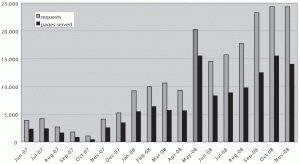I am very happy to announce that Tanzanian Affairs now has two coeditors. Seven BTS members responded to the advertisement I placed in the BTS Newsletter some months ago asking for a volunteer deputy editor. I would like to apologise to the other BTS members who offered to help in various ways and have not yet heard from me. It has taken several months to decide what to do in view of the wealth of experience which you all offered. I am very grateful and would like to keep your names on file so that we can perhaps call on you again at some future date. Both of the new co-editors speak Swahili fluently and visit the country frequently.
Donovan Mc Grath is a full-time lecturer in Media and Communications and a part-time lecturer in Swahili. He is an Alumnus of the University of London’s School of Oriental and African Studies (SOAS) where he gained a BA Honours degree in African Language and Culture. He also studied Swahili Poetry, the Swahili Novel and Advanced Swahili Usage at the University of Dar es Salaam. Later on, at Middlesex University, he achieved a Master of Arts degree in Film and Visual Cultures. He is co-author of Colloquial Swahili, published by Routledge in 2003. He has also written extensively on the subject of film and theatre for Live magazine here in the UK and book reviews (in Swahili) for Femina magazine in Tanzania. As his first contribution Donovan has written the largest part of our feature ‘Tanzania in the International Media’ in this issue. The other co-editor is Jacob Knight, an engineer stationed in Botswana who keeps in close touch with what is happening in Tanzania. He has been playing a vital role in the production of TA for some time as typesetter and graphic designer and also now produces Tanzanian Affairs on line at www.tzaffairs.org which is attracting a growing readership.

Number of hits each month on the www.tzaffairs.org website
Jacob is hoping to upload more back issues of Tanzanian Affairs onto the website to make a searchable archive dating back to the first issue in 1975. While much of the process is automated, human input is required in tidying up the text files and correcting the mistakes made by the computer when “reading” the printed copies – any volunteers to assist with this would be appreciated (email jacob@kwangu.com).
David Brewin, Editor.
